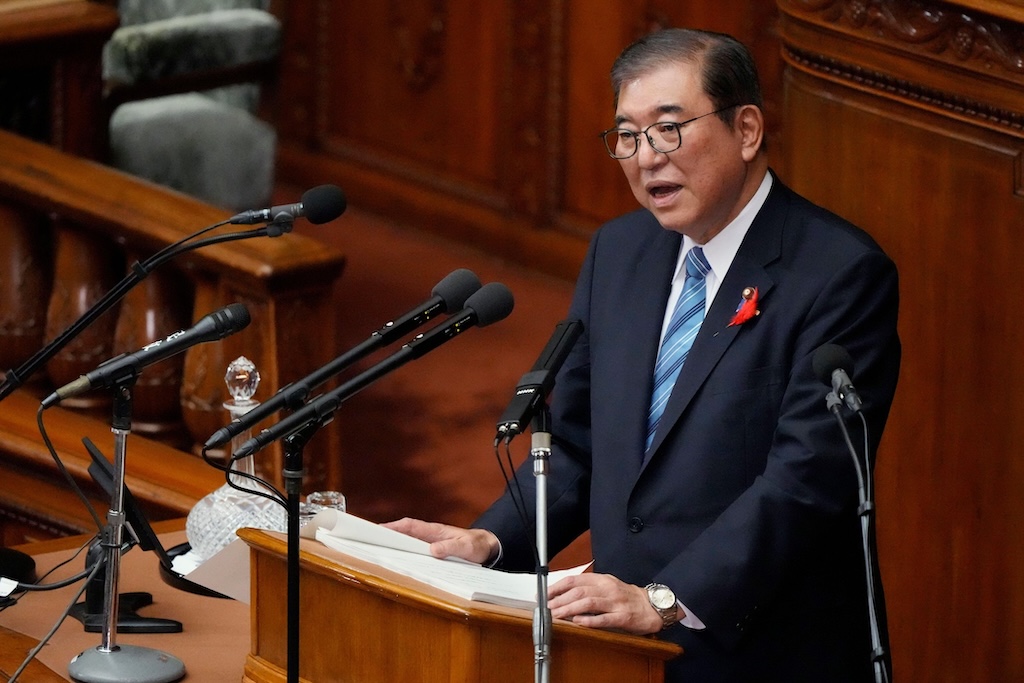
DeBriefed 4 October 2024: UK turns the lights out on coal; Hurricane Helene; Where does Japan’s new PM stand on climate?
Joe Goodman
10.04.24Joe Goodman
04.10.2024 | 4:11pmWelcome to Carbon Brief’s DeBriefed.
An essential guide to the week’s key developments relating to climate change.
This week
Farewell to coal
142 YEARS: The UK’s “142-year history of coal-fired electricity” ended on Monday as the UK’s last coal power station, Ratcliffe-on-Soar, turned off its turbines for the final time, reported the Guardian. The UK is now the first major economy and the first country in the G7 to successfully phase out coal power, reported the Times.
10BN TONNES: From 1882 until Ratcliffe’s closure, the UK’s coal plants will have burned through 4.6bn tonnes of coal and emitted 10.4bn tonnes of carbon dioxide (CO2) – more than most countries have ever produced from all sources, according to a comprehensive timeline of the nation’s coal phase-out from Carbon Brief. Carbon Brief’s analysis was cited by publications globally, ranging from US radio station NPR to Indonesian newspaper Kompas.
PERMISSION REFUSED: In other coal news, the UK’s coal regulator the Coal Authority refused to grant licences for what would have been the country’s first new coal mine in 30 years, the Press Association reported. Also on Monday, Tata Steel, the UK’s biggest steelworks, shut down its last coal-powered furnace after more than 100 years, reported Sky News.
Global storms
HURRICANE HELENE: More than 200 people have been killed and at least one million are still without power after Hurricane Helene hit the US south-east and midwest last week, reported CNN. A preliminary study from the Lawrence Berkeley National Laboratory found that “climate change caused 50% more rainfall during the hurricane in some parts of Georgia and the Carolinas”, the Guardian reported. Hurricane Helene is now the second deadliest to hit the US after Hurricane Katrina, reported the Times.
SWING STATES: Georgia and North Carolina are both key battlegrounds for presidential candidates Donald Trump and Kamala Harris, reported Reuters. Former president Donald Trump visited victims in Georgia on Monday evening, only to court oil executives during meetings held on Wednesday, reported the Guardian. Vice-president Kamala Harris visited Georgia on Wednesday calling the damage “extraordinary” and the loss of life “particularly devastating”, reported the Washington Post.
TYPHOON KRATHON: At least two people have been killed after Typhoon Krathon slammed into Taiwan, Al Jazeera reported. Typhoons often hit the east coast of the island, but Krathon directly hit the west coast, leading Taiwan’s media to label it a “weird” storm, the publication added. In Nepal, heavy flooding and rain killed 193 people in Kathmandu and the surrounding area, the Associated Press reported.
Around the world
- BLACK GOLD: Oil prices have breached $75 a barrel amid reports that Israel could strike Iranian oil facilities, fuelling fears of conflict escalation and resulting global energy supply disruption, reported the Times.
- DRAW DOWN: The UK government announced up to £21.7bn of support over 25 years for carbon capture and storage projects, the Financial Times reported. Meanwhile, a Carbon Brief exclusive reported that the nation will miss the deadline to submit a new nature pledge ahead of the COP16 biodiversity summit this month.
- FORESTS FEATURE: Environment ministers from the Group of 20 (G20) nations agreed on Thursday to increase funding for tropical forest conservation, the Associated Press reported. It comes as the EU moved to delay its anti-deforestation law for a year amid trade backlash, the Financial Times said.
- UNCHARTED TERRITORY: Melting glaciers fuelled by climate change have forced Italy and Switzerland to redraw a border in the Alps, the Daily Telegraph reported.
- EU TARIFFS: The European Commission is set “to adopt tariffs” of up to 45% on Chinese electric vehicles after saying it had received enough support from member states in a vote earlier today, Reuters reported.
106 million
The amount of CO2, in tonnes, released by Arctic wildfires this summer, roughly equivalent to the annual emissions of Kuwait, reported the Times.
Latest climate research
- National rates of partner violence against women can be higher two years after some climate “shocks”, such as storms, landslides and floods, according to a study in PLOS Climate.
- A new study in Communications Earth and Environment found that the northern Amazon has seen a three-fold increase in the number of days with “extreme fire weather conditions” since 1971.
- Satellite images suggest that the Antarctic Peninsula is experiencing “an accelerated rate” of “greening” in response to recent warming, according to research published in Nature Geoscience.
(For more, see Carbon Brief’s in-depth daily summaries of the top climate news stories on Monday, Tuesday, Wednesday, Thursday and Friday.)
Captured

Following a rapid withdrawal from nuclear power after the Fukushima nuclear disaster in 2011, 10 of Japan’s 33 nuclear reactors are now back online. Nuclear was a key topic of debate in the country’s recent leadership race, touted by business leaders and the previous administration as a necessity for energy security and to meet decarbonisation goals. New leader Shigeru Ishiba (more below) entered the campaign with a platform of reducing nuclear power to “close to zero”. Just one day after taking office, however, he released a nuclear plan consistent with the previous administration, reported Reuters.
Spotlight
Japan’s new prime minister and climate change
This week, Carbon Brief speaks to experts about where Japan’s new prime minister stands on climate change, nuclear and renewables.
Japan welcomed its 65th prime minister on Tuesday as Shigeru Ishiba won the closest leadership race in almost seven decades to become the next leader of the ruling Liberal Democratic Party (LDP) party.
Ishiba is a former defence and agriculture minister who has sat in parliament for almost four decades.
Ishiba has previously demonstrated an impressive literacy on climate change, likely influenced by his childhood in the rural prefecture of Tottori, Tobias Harris, founder of Japan Foresight, a Japan-focused advisory firm in the US, told Carbon Brief:
“Judging by his August 2024 book Hoshu seijika [Conservative Politician], he is well informed of the science on climate change, citing IPCC [Intergovernmental Panel on Climate Change] reports, noting the impacts ranging from wildfires, methane gas release in Siberia, sea level rise, and more severe storms, as well as the human impacts, including refugee flows, food and water shortages, and, interestingly, the possibility for ‘climate fascism’ – he actually uses the phrase.
“It’s hard to think of a Japanese politician of his stature who has used this kind of language to talk about climate change.”
As part of his platform, Ishiba proposed a new government agency for disaster management in response to extreme weather events in Japan.
As recently as August, Typhoon Shanshan caused widespread damage in Japan, killing seven and leaving at least 131 injured. A rapid attribution study by Imperial College London found Typhoon Shanshan was made 7.5% more intense and 26% more likely by climate change.
Renewables and nuclear
At the start of his campaign, Ishiba broke with mainstream LDP thought by advocating for maximising Japan’s renewable potential, while reducing reliance on nuclear power to “close to zero”.
Under the previous administration, Japan had sought to actively restart nuclear plants and develop new ones to meet energy security and climate goals. But nuclear remains a controversial subject in Japan following the Fukushima disaster in 2011, in which a tsunami flooded a power plant and caused more than 2,000 “disaster-related deaths” in the prefecture.

Just a day into his premiership, however, Ishiba’s newly appointed minister of economy, trade and industry told a press conference that Japan would continue restarting nuclear plants under Ishiba’s government.
This “appears to be a continuation of previous administrations’ positions”, Yuri Okubo, a senior researcher at the Renewable Energy Institute in Japan, told Carbon Brief.
This policy change could have been influenced by pressure from business groups, Yuko Nakano, Japan chair at the Center for Strategic and International Studies in the US, added to Carbon Brief:
“Comments from business leaders reflect the private sector’s caution towards the new prime minister’s [original] energy policy.”
With a snap election later this month, Ishiba will also be seeking to “heal party divisions and secure a national mandate”, Reuters reported.
Meanwhile, the government is in the process of revising its strategic energy plan, which will set the course of Japan’s energy policies in the medium and long-term, Nakano told Carbon Brief. It is expected by March 2025.
Harris told Carbon Brief that “Ishiba’s shift” reveals “how the politics around nuclear energy have shifted in recent years” in Japan, adding:
“Whereas it was once primarily touted as a way to promote energy independence, it has increasingly been promoted as part of its decarbonisation efforts.”
Watch, read, listen
SOLAR BOOM: The DER Task Force podcast spoke to Jenny Chase of Bloomberg New Energy Finance about Pakistan’s distributed solar boom.
‘PEACEWASHING’: Ahead of COP29 next month, human rights professor Brian Brivati in the Conversation discussed Azerbaijan’s history, including “military aggression, human rights abuses and violations of international law”.
VAN GOGH PROTEST: Politico dived into the story of two climate activists who were imprisoned last week after throwing paint over a Van Gogh.
Coming up
- 9 October: Mozambique presidential and parliamentary elections
- 9 October: International Energy Agency (IEA) Renewables 2024 report launch
- 10-12 October: China Council for International Cooperation on Environment and Development (CCIED) annual general meeting, Beijing
Pick of the jobs
- Duke University, assistant professor of climate policy (accenture chair) | Salary: Unknown. Location: Durham, North Carolina
- Royal Geographical Society, press and digital communications officer | Salary: £32,590 to £35,385. Location: London
- CPRE The Countryside Charity, media officer | Salary: £41,006. Location: London
- Environment Agency, carbon specialist | Salary: £39,635. Location: UK
DeBriefed is edited by Daisy Dunne. Please send any tips or feedback to [email protected].
This is an online version of Carbon Brief’s weekly DeBriefed email newsletter. Subscribe for free here.
-
DeBriefed 4 October 2024: UK turns the lights out on coal; Hurricane Helene; Where does Japan’s new PM stand on climate?



